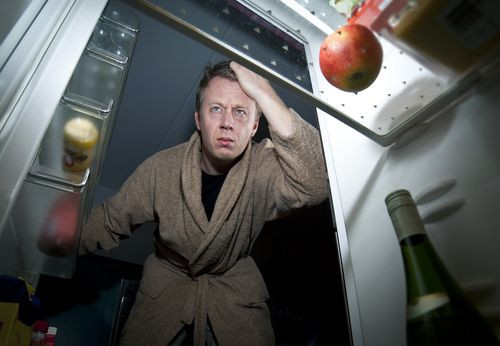No More Late-Night Snacks: Why Sleep Is More Important Than Food

Don’t take Randy Gardner’s word for it. Ten days into the 17-year-old’s 1964 mission to beat the existing no-sleep record of 260 hours and 17 minutes, he bested the researcher studying his case in a game of pin ball.
Of course, nature got the best of Gardner eventually, some 264 hours and 11 minutes into the challenge. After staying up for a week and a half straight, Gardner had begun to hallucinate and lost entire chunks of his cognitive ability and concentration. Most of us succumb to a version of this fate after only one day of losing sleep, revealing in a matter of hours just how important the behavior is.
Interestingly, we don’t think of food in this way. We eat every day, even though we can go entire weeks relying on the current energy stores in our body. In reality, we think about food the way we think about water. It’s precious, a thing to be grateful for because our bodies need it now. Meanwhile, we think about sleep the way we think about work. We lose an hour here, gain an hour there. Everything evens out. But we don’t, and it doesn’t, and the truth is our thinking is totally backward.
What’s Important?
Saying food is less important than sleep first requires a working definition of importance. In real terms, perhaps the only terms that matter, the relative importance of food and sleep can be defined by how long the activity could be avoided before your body breaks down — to the point where it can no longer function, and you die.
Michael Peel, senior medical examiner at the Medical Foundation for the Care of Victims of Torture, published a 1997 study of hunger strikes in which he documented cases of people going 28 days, 36 days, and sometimes a full 40 days without food. These tests of endurance were mostly religious in nature and designed to make a symbolic statement. Mahatma Gandhi, for instance, went 21 days without food during his hunger strike, consuming only small sips of water.
Sleep deprivation, on the other hand, takes its toll immediately. Within 24 hours, your blood pressure rises from a surge of cortisol. Within roughly a week, you’ll begin to hallucinate, losing nearly all ability to focus. Rat studies, the closest analog we have to actual human cases, have shown that 32 days is an approximate upper threshold for sleep deprivation. Some theorize it was the result of hypothermia that killed the rats; others say their immune systems turned against them. Still others claim stress was the culprit.
What’s at Stake?
It’s no wonder sleep deprivation is recognized as a form of torture. Former Israeli Prime Minister Menachem Begin writes in his memoir White Nights about the unending despair of being forced to stay awake in a KGB prison: “In the head of the interrogated prisoner a haze begins to form. His spirit is wearied to death, his legs are unsteady, and he has one sole desire: to sleep … Anyone who has experienced this desire knows that not even hunger and thirst are comparable with it.”
Sleep deprivation attacks the mind — the master. Starvation plays the long game, breaking down vital organ functions until the body simply can’t go on. Sleep deprivation robs the brain, the primary source, of the ability to execute these functions.
All signs point toward preserving our mental health, via more sleep, but the unsettling truth is that we still put a far greater premium on physical well-being than on psychological well-being. A recent Gallup poll showed Americans are getting less sleep every year. Currently only 40 percent of the U.S. gets the recommended eight hours, on average receiving only 6.8 hours per night.
Meanwhile, we obese Americans seldom fail to keep our bellies full. Obesity in the United States has reached a prevalence of 34.9 percent, according to the Centers for Disease Control and Prevention. We work longer days, sitting at desks that render our legs useless, only to have enough time to get takeout on the way home before household chores call us to a different kind of work. At the end of it all, we bombard our eyes with backlit LCD screens that disrupt our melatonin production and leave us feeling tired because we didn’t sleep well the night before.
Food is a resource we have in abundance. Time isn't. And if we keep underestimating sleep's importance, we'll have even less of it.



























